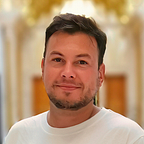On the DAO framework and what it means for the space.
“Exponential growth” — this is how I’d describe the level of interest in the DAO framework project. This is reflected in the Slack numbers, where the weekly number of new participants hovered between 30–70 from September until late February, then jumped to 400 the first week of March, then 500 the following week, 600 last week and 800 as of today. Latest tally: 3,360, making ours the largest crypto community on Slack to date.
The best news by far is that in the last week alone three Ethereum projects — no less! — have announced they will be using the audited DAO code to power their governance models! To these, two more, in stealth mode, have expressed interest — one of them a charity which we’re particularly excited about covering more in this blog when the time comes. Each day brings us closer to our dream of building a fair, 100% decentralized framework for the economy of the 21st century.
With excitement at an all time high, I felt it was important to issue a couple of reminders about DAOs.
“DAO”, the new “Big Data”
The first, is that the lingo of decentralization is being severely abused these days — starting with the word “DAO”. If someone or something holds 80% of the tokens, if DAO token holders don’t have voting power to fire their Contractors or Curators, or if they are given vague promises such as ‘by 2050 you’ll own 100% of the DAO’ — then it’s NOT a DAO.
Keep in mind that anyone could claim to have built a DAO, or even claim to leverage the code we made available, yet end up delivering something completely centralized and unfair — or worse. It’s your responsibility as end users to make sure the code does what it says it will. Help each other out, converse on forums, audit the code or have the code audited. In short: do your due diligence.
Here be Dragons
Which leads me to to my second point: DAOs are a new concept. Even when implemented ‘properly’, their legal status remains the subject of active and vigorous debate and discussion. Not everyone shares the same definition. Some have said that they are autonomous code and can operate independently of legal systems; others have said that they must be owned or operated by humans or human created entities.
We ourselves have used terminology in different ways as our understanding of the DAO has evolved. There will be many uses cases, and the DAO code will develop over time. Ultimately, how a DAO functions and its legal status will depend on many factors, including how DAO code is used, where it is used, and who uses it.
As you know, Slock.it UG is a Blockchain + IoT solutions company. However Slock.it UG (future GmbH) is not a DAO itself — we are a for-profit company registered in Germany (in the picturesque town of Mittweida to be specific). We are creating what we hope will be the future infrastructure of the Sharing Economy. We believe that Decentralized autonomous organizations (“DAOs”) will play an important role in that infrastructure. To that end, we have devoted considerable time and resources to creating a generic Whitepaper and DAO code and making it available on an open source basis to the general public.
The future remains a work in progress. Our vision exists in a world where laws vary widely. To that end, it is important to remember that anyone who uses DAO code will do so at their own risk. We can’t speculate about the legal status of DAOs worldwide. Whatever our personal beliefs, people must draw their own conclusions, relying on legal advice where appropriate. Slock.it is not a law firm and we are not in the business of offering legal advice. If you create a DAO it will be your DAO, and you will be responsible for its operation.
As for Slock.it’s own potential relationship with a DAO or DAO governed entity: we will engage in a way that is compliant with applicable laws and regulations. We hope to have more information for you on this topic in the near term.
Thank you for asking questions and helping us bring decentralization to the mainstream. We look forward to building the future with you!
About the Author
Stephan Tual is the Founder and COO of Slock.it.
Previously CCO for the Ethereum project, Stephan has three startups under his belt and brings 20 years of enterprise IT experience to theSlock.it project. Before discovering the Blockchain, Stephan held CTO positions at leading data analytics companies in London with clients including VISA Europe and BP.
His current focus is on the intersection of blockchain technology and embedded hardware, where autonomous agents can transact as part of an optimal “Economy of Things”.
Twitter: @stephantual
Contact: stephan@slock.it
If you enjoyed reading this, please log in and click “Recommend” below.
This will help to share the story with others.
